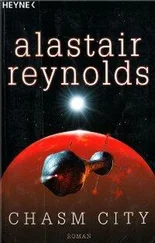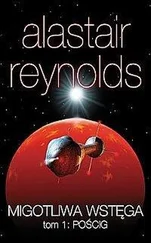Rashmika continued, “Something wiped them out a million years ago. When humans colonised Resurgam, no one wanted to consider the possibility that whatever had wiped out the Amarantin might come back to do the same to us. Except Dan Sylveste, of course.”
“Dan Sylveste?” Linxe asked. “Sorry—also not ringing any bells.”
It infuriated Rashmika: how could she not know these things? But she tried not to let it show. “Sylveste was the archaeologist in charge of the expedition. When he stumbled on the truth, the other colonists silenced him. They didn’t want to know how much trouble they were in. But as we know, he turned out to be right in the end.”
“I bet you feel a little affinity with him, in that case.”
“More than a little,” Rashmika said.
* * *
Rashmika still remembered the first time she had come across his name. It had been a casual reference in one of the archaeological texts she had uploaded on to her compad, buried in some dull treatise about the Pattern Jugglers. It was like lightning shearing through her skull. Rashmika had felt an electrifying sense of connection, as if her whole life had been a prelude to that moment. It was, she now knew, the instant when her interest in the scuttlers shifted from a childish diversion to something closer to obsession.
She could not explain this, but nor could she deny that it had happened.
Since then, in parallel with her study of the scuttlers, she had learned much about the life and times of Dan Sylveste. It was logical enough: there was no sense in studying the scuttlers in isolation, since they were merely the latest in a line of extinct galactic cultures to be encountered by human explorers. Sylveste’s name loomed large in the study of alien intelligence as a whole, so a passing knowledge of his exploits was essential.
Sylveste’s work on the Amarantin had spanned many of the years between 2500 and 2570. During most of that time he had either been a patient investigator or under some degree of incarceration, but even while under house arrest his interest in the Amarantin had remained steady. But without access to resources beyond anything the colony could offer, his ideas were doomed to remain speculative. Then Ultras had arrived in the Resurgam system. With the help of their ship, Sylveste had unlocked the final piece of the puzzle in the mystery of the Amarantin. His suspicions had turned out to be correct: the Amarantin had not been wiped out by some isolated cosmic accident, but by a response from a still-active mechanism designed to suppress the emergence of starfaring intelligence.
It had taken years for the news to make it to other systems. By then it was second or third hand, tainted with propaganda, almost lost in the confusion of human factional warfare. Independently, it seemed, the Conjoiners had arrived at similar conclusions to Sylveste. And other archaeological groups, sifting through the remains of other dead cultures, were coming around to the same unsettling view.
The machines that had killed the Amarantin were still out there, waiting and watching. They went by many names. The Conjoiners had called them wolves. Other cultures, now extinct, had named them the Inhibitors.
Over the last century, the reality of the Inhibitors had come to be accepted. But for much of that time the threat had remained comfortably distant: a problem for some other generation to worry about.
Recently, however, things had changed. There had long been unconfirmed reports of strange activity in the Resurgam system: rumours of worlds being ripped apart and remade into perplexing engines of alien design. There were stories that the entire system had been evacuated; that Resurgam was now an uninhabitable cinder; that something unspeakable had been done to the system’s sun.
But even Resurgam could be ignored for a while. The system was an archaeological colony, isolated from the main web of interstellar commerce, its government a totalitarian regime with a taste for disinformation. The reports of what had happened there could not be verified. And so for several more decades, life in the other systems of human-settled space continued more or less unaffected.
But now the Inhibitors had arrived around other stars.
The Ultras had been the first to bring the bad news. Communications between their ships warned them to steer clear of certain systems. Something was happening, something that transgressed the accepted scales of human catastrophe. This was not war or plague, but something infinitely worse. It had happened to the Amarantin and—presumably—to the scuttlers.
The number of human colonies known to have witnessed direct intervention by Inhibitor machines was still fewer than a dozen, but the ripples of panic spreading outwards at the speed of radio communications were almost as effective at collapsing civilisations. Entire surface communities were being evacuated or abandoned, as citizens tried to reach space or the hopefully safer shelter of underground caverns. Crypts and bunkers, disused since the dark decades of the Melding Plague, were hastily reopened. There were, invariably, too many people for either the evacuation ships or the bunkers. There were riots and furious little wars. Even as civilisation crumbled, those with an eye for the main chance accumulated small, useless fortunes. Doomsday cults flourished in the damp, inviting loam of fear, like so many black orchids. People spoke of End Times, convinced that they were living through the final days.
Against this background, it was hardly any wonder that so many people were drawn to Hela. In better times, Quaiche’s miracle would have attracted little attention, but now a miracle was precisely what people were looking for. Every new Ultra ship arriving in the system brought tens of thousands of frozen pilgrims. Not all of them were looking for a religious answer, but before very long, if they wanted to stay on Hela, the Office of Blood-work got to them anyway. Thereafter, they saw things differently.
Rashmika could not really blame them for coming to Hela. Had she not been born here, she sometimes thought she might well have made the same pilgrimage. But her motives would have been different. It was truth she was after: the same drive that had taken Dan Sylveste to Resurgam; the same drive that had brought him into conflict with his colony and which, ultimately, had led to his death.
She thought back to Linxe’s question. Was it really Harbin driving her towards the Permanent Way, or was Harbin just the excuse she had made up to conceal—as much from herself as anyone else—the real reason for her journey?
Her reply that it was all to do with Harbin had been so automatic and flippant that she had almost believed it. But now she wondered whether it was really true. Rashmika could tell when anyone around her was lying. But seeing through her own deceptions was another matter entirely.
“It’s Harbin,” she whispered to herself. “Nothing else matters except finding my brother.”
But she could not stop thinking of the scuttlers, and when she dozed off with the mug of chocolate still clasped in her hands, it was the scuttlers that she dreamed of, the mad permutations of their insectile anatomy shuffling and reshuffling like the broken parts of a puzzle.
Rashmika snapped awake, feeling a rumble as the icejammer slowed, picking up undulations in the ice trail.
“I’m afraid this is as far as we can go tonight,” Crozet said. “I’ll find somewhere discreet to hide us away, but I’m near my limit.” He looked drawn and exhausted to Rashmika, but then again that was how Crozet always looked.
“Move over, love,” Linxe said to Crozet. “I’ll take us on for a couple of hours, just until we’re safe and sound. You can both go back and catch forty winks.”
Читать дальше












